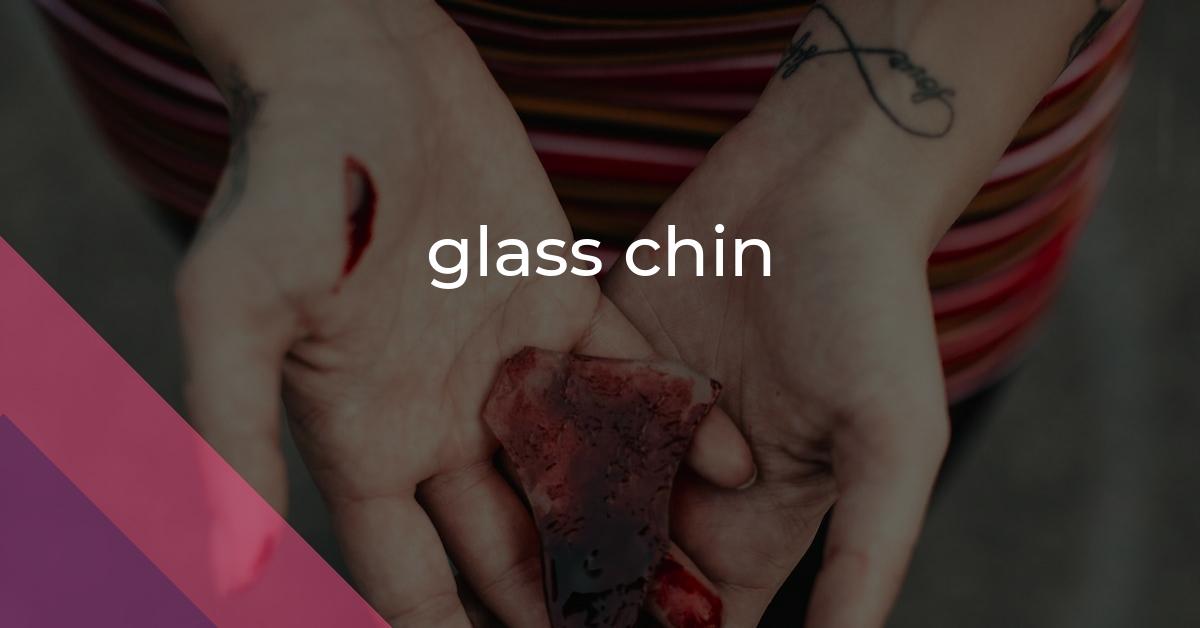glass chin: Idiom Meaning and Origin
What does ‘glass chin’ mean?
The idiom "glass chin" is used to describe someone who is easily hurt, either physically or emotionally, and cannot handle criticism or difficult situations well.

Idiom Explorer
The idiom "thin-skinned" refers to a person who is easily offended or sensitive to criticism or insults.
The idiom "heart of glass" is used to describe someone who is emotionally fragile or sensitive, often referring to someone who is easily hurt or vulnerable.
The idiom "harden someone's heart" means to make someone's emotions or feelings become less compassionate or sympathetic, often due to experiencing a series of negative or hurtful events.
The idiom "hard as nails" means to be strong, tough, or unbreakable in character, attitude, or physical strength.
The idiom "hammer-headed" refers to someone who is stubborn or obstinate, often refusing to listen to reason or change their mind.
The idiom *glass-half-full* refers to having an optimistic outlook on life or a positive attitude, focusing on the positive aspects of a situation rather than the negatives.
The idiom "give someone a bloody nose" means to physically or metaphorically harm or defeat someone, often resulting in humiliation or embarrassment to the person being targeted.
An idiom meaning someone is not very intelligent or mentally unstable.
"Feet of clay" is an idiom that means to have a hidden flaw or weakness, despite appearing strong or admirable on the surface.
Shattered Defenses
The idiom "glass chin" originated in the world of boxing and is used to describe a fighter who is easily knocked out, particularly when hit on the chin. This expression has also become widely used to describe vulnerability or weakness in general. The term "glass chin" gained popularity in the boxing world, where it was used to describe a fighter who lacked the ability to withstand punches to the face without being knocked down.
The fragility and vulnerability associated with glass is what gives the idiom its metaphorical meaning. Just like glass, a person with a glass chin is easily broken or knocked out in a fight. This idiom has transcended its original context and has become recognized outside of the sport. It is often used metaphorically to refer to someone who is easily affected or defeated by a situation.
The figurative meaning of "glass chin" extends beyond being physically easily knocked out. It is often used to describe individuals who lack resilience or the ability to handle adversity. To have a "glass chin" is to be emotionally or psychologically fragile, making one vulnerable to criticism, setbacks, or failures. This idiom serves as a reminder of the importance of mental and emotional strength in facing challenges.
Another idiom related to the concept of vulnerability is "heart of glass." This expression is often used to describe someone who is emotionally fragile or easily hurt. Just like glass is delicate, a person with a "heart of glass" is sensitive and easily broken. This idiom emphasizes the need for empathy and understanding when dealing with individuals who are emotionally fragile.
"thin-skinned" is another idiom that is related to vulnerability and sensitivity. This expression is used to describe someone who is easily offended or hurt by criticism or negative comments. Just like thin skin is easily punctured or injured, a person who is "thin-skinned" is easily affected by the words or actions of others. This idiom reminds us to choose our words carefully and be mindful of the impact they can have on others.
"chink in the armor" is an idiom that refers to a weakness or vulnerability in someone's defenses or plans. It originated from the medieval practice of using armor to protect oneself in battle. A small chink or opening in the armor could leave a person vulnerable to attacks. In a metaphorical sense, a "chink in the armor" signifies a vulnerability or weakness that can be exploited. This idiom serves as a reminder to be aware of our own weaknesses and to address them before they can be exploited.
While the idiom "glass chin" originated in the world of boxing, its relevance has expanded to depict vulnerability and fragility in a broader sense. It has become a powerful symbolic expression used to highlight the susceptibility of individuals in various aspects of life, not just in physical confrontations. The idiom serves as a reminder that strength and resilience are crucial attributes to cultivate in order to navigate the challenges and obstacles that we encounter.
Despite its widespread usage, the idiom "glass chin" still possesses an air of mystery and intrigue. It continues to captivate our imagination and prompt us to reflect on the delicate and fragile nature of human beings. In the realm of idioms, "glass chin" stands as a poignant reminder of the potential vulnerabilities that exist within us all, challenging us to examine our own strengths and weaknesses.
Example usage
Examples of how the idiom "glass chin" can be used in a sentence:
- He may be a skilled boxer, but his glass chin makes him vulnerable to knockout punches.
- Whenever he gets into an argument, his glass chin becomes evident as he quickly backs down.
- The team's lack of perseverance is their glass chin, causing them to give up easily when faced with challenges.
More "Sports" idioms



